If you want to grow healthier, bigger, brighter roses that produce loads of blooms longer than ever, then it’s vital to fertilize your rose bushes with the perfect dose of power – and it all starts with powering them up in the early spring just as your roses come out!
Roses are heavy-blooming plants that are also heavy feeders from the soil. They continually drain nutrients and resources as they grow. Not only to produce their beautiful blooms, but to also grow thick foliage and new shoots as well.
Unfortunately, it doesn’t take long for those vital nutrients and resources to disappear. And if they aren’t replenished, you can quickly be left with weak foliage and fewer blooms. Even worse, it also leaves your roses more susceptible to disease, pests, and winter damage.
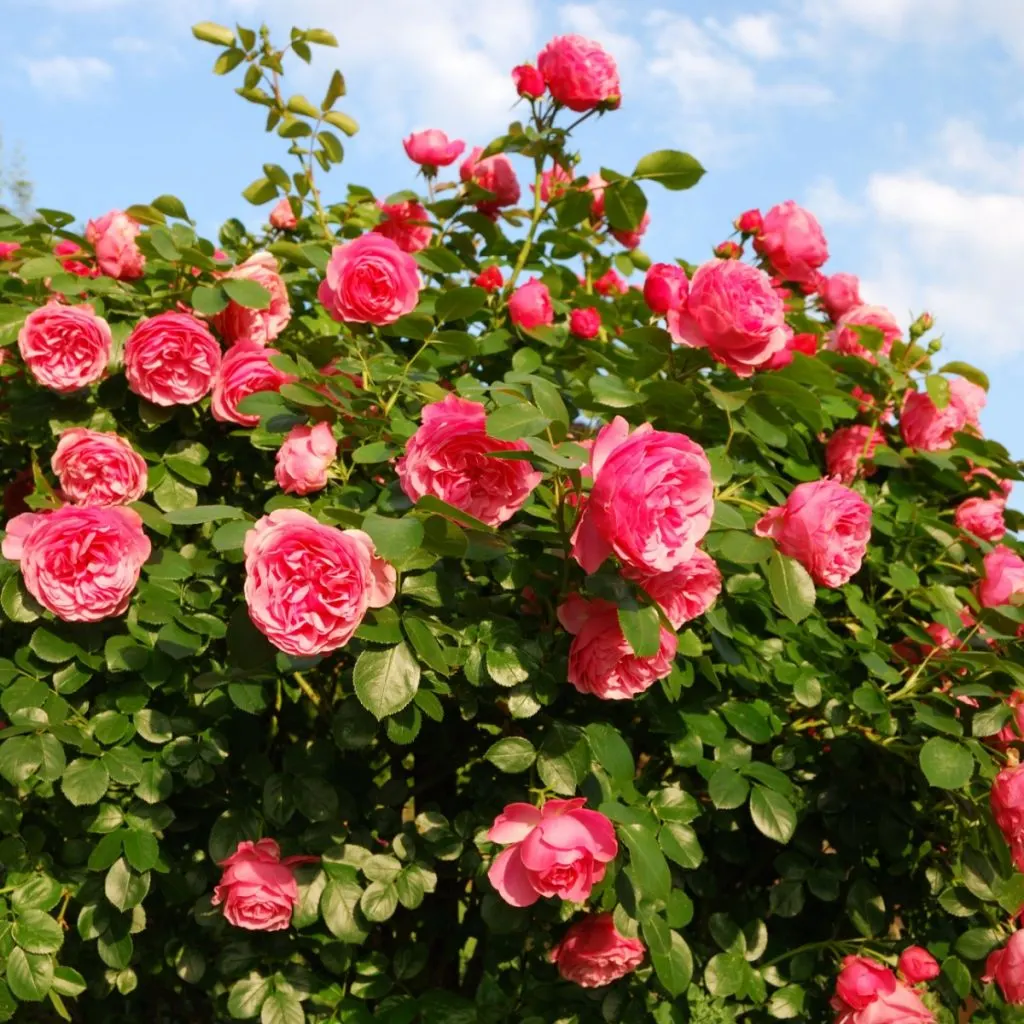
The good news is that keeping your roses and the soil around them full of power isn’t difficult. In fact, by simply using the right type of fertilizers at a few key times of the year, you can have your rose bushes looking healthy and producing stunning blooms all summer long!
Giving Roses The Nutrients They Need
So what are the key nutrients roses need for optimum growth and blooming? In addition to the mainstays of nitrogen, phosphorus, and potassium (N-P-K), roses also need other important nutrients. Roses also require small doses of calcium, sulfur, copper, manganese, and a host of other micro-nutrients. And to have great roses, it’s critical to give them all of these when feeding.
How much additional power a rose bush will need depends on the type of rose you are growing. For instance, Grandiflora and miniature roses require more constant feeding. As do tea rose varieties and roses growing in pots or in confined spaces.
However, with more stable climbing and shrub roses, the need for constant feeding is not as vital. These roses still need to be fed, but just not as often. But no matter what type of rose you grow – giving them power in the spring is vital to set them up for a strong blooming season!
How & When To Fertilize Rose Bushes
The Best Fertilizers For Roses
Before we cover how to fertilize your roses, it’s important to cover how to select the best type of fertilizer to power your bushes.
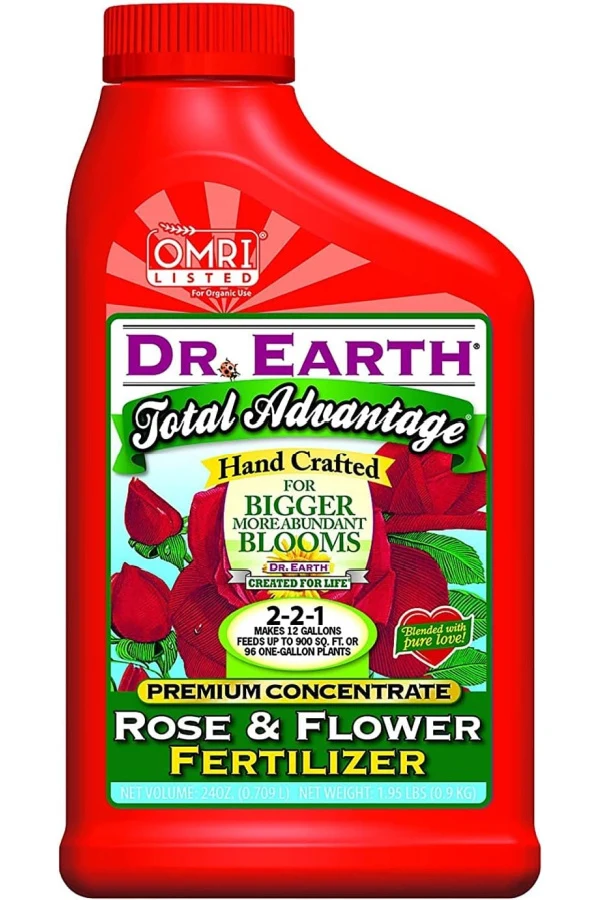
There are two main types of fertilizers you can use for roses – slow release granular types, and liquid fertilizers, which deliver their nutrients much more quickly. Both types of fertilizers have their place when powering rose bushes.
In general, you want to use a slow release fertilizing option for early spring. This will allow nutrients to slowly soak into the soil and give roses the energy they need over time as they come out of dormancy. Later, as your roses near blooming, liquid fertilizing is the better option.
Here is a look at how each type works, and how and when to use them to power your rose bushes to a better year than ever!
Early Spring Fertilizing – Using Slow Release Fertilizers
All roses types need early spring fertilizing. This dose of power helps roses to wake up and not only produce their foliage, but begin to store energy for their blooms later in the season. And for spring fertilizing, it’s all about using a slow release option!
There are several great options for slow release early spring fertilizing. The first is to use a commercial granular fertilizer that is geared especially for roses.
These fertilizers not only contain the right ratio of the key ingredients of nitrogen, phosphorous and potassium roses need, but also the calcium, soluble potash and magnesium as well. Affiliate Link: Jobe’s Organics Granular Fertilizer for Rose & Flower
When it comes to other good options for slow release fertilizers, two of the best are worm castings and compost. When used together, they can provide a steady supply of readily available early spring power. Power that can keep rose bushes healthy and blooming strong all season long.
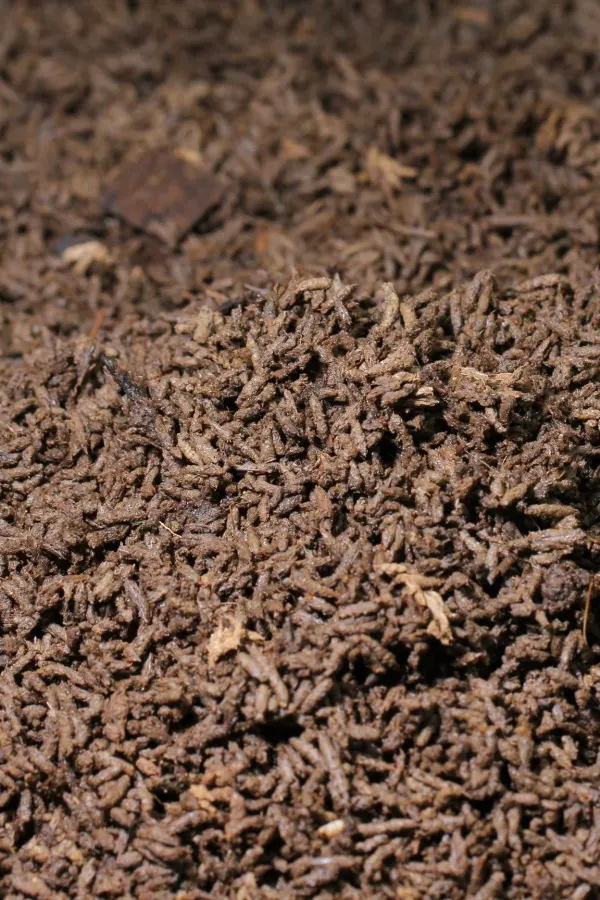
Worm castings work as the perfect slow release fertilizer when they are applied to the soil around rose bushes. Simply mix 1/2 cup to a full cup of castings in the soil early in the season to provide plenty of steady power. Product Link: Worm Castings
Because castings can be slightly alkaline and roses prefer slightly acidic soil, applying a few cups of compost to the base of plants when feeding with castings will help counterbalance that. Compost is 100% organic and its nutrients are easily absorbed by roses. These two can be used in place of granular fertilizers if desired.
Late Spring / Summer Fertilizing – Using Liquid Fertilizers To Fertilize Rose Bushes
Liquid fertilizing is the perfect complement to slow release fertilizing once plants are ready to bloom. Again, all rose bush types need and will benefit from a slow release granular feeding in the spring. But then it’s time to use a liquid option for blooms.
Liquid fertilizers can be used throughout the late spring and summer on all types as well – but how and when you use them will depend on the type of rose bush. We will cover each of those types below and when and how to fertilize, but let’s first cover the options for liquid rose fertilizer.
If using a commercial fertilizer, select one that is specifically geared to roses. Commercial liquid fertilizers can be easily diluted with water to the recommended dose rate. Affiliate Link: Dr. Earth Total Advantage Rose and Flower Liquid Fertilizer Concentrate

If you want a homemade option, you can create a powerful fertilizing tea from either compost or worm castings. The tea can easily absorb through the roots and leaves of roses. Worm casting tea can also help with disease resistance for issues such as black spot. See: How To Use Worm Castings – The Best Fertilizer For Flowers & Veggies!
Now let’s take a look at each rose type and how to fertilize in late spring and summer with a liquid option.
When To Fertilize Your Rose Bushes With Liquid Fertilizer
Shrubs and Climbing Roses
For more hardy and established shrub and climbing roses, you will only need to fertilize twice. The first is in early spring with the granular option. And the second is with a liquid fertilizer as soon as the blooms begin to appear. These types of roses do not require more that just two doses.
Tea Roses & Standard Roses
For tea and other standard rose bushes, a bit more frequent liquid fertilizing during the season will help for more prolific blooming. After the initial feeding in early spring of granular fertilizer, apply additional doses of liquid fertilizer every 3 to 4 weeks during the growing season.
If you are growing your roses in a confined space such as a container or pot, apply the liquid fertilizer every two to three weeks to keep the soil productive. Potted plants tend to run out of nutrients at a quicker pace due to the limited soil.
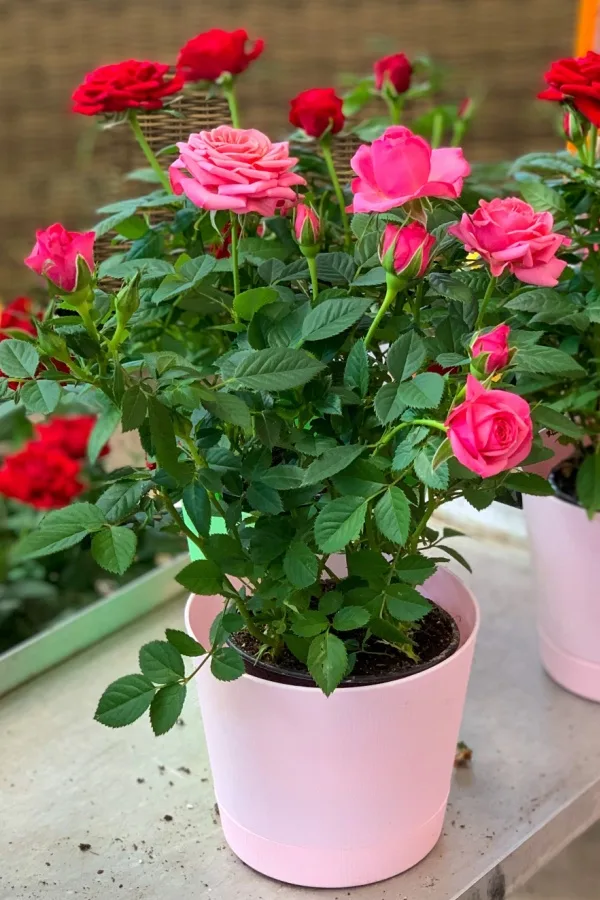
When using any liquid fertilizer, always apply it in the early morning or evening. At these two times, the sun’s rays are less intense and will not burn the foliage when applied.
When To Stop Fertilizing Rose Bushes
One of the biggest mistakes gardeners make with roses is to fertilize them too late in the growing season. Giving any type of rose bush additional nutrients in late summer or early fall can actually harm plants way more than help them.
All fertilizing should cease around eight weeks before the average first frost date in your area. Fertilizing after this point will cause your bushes to produce tender new growth too late in the year. See: How To Prepare Rose Bushes For Winter – The Secrets To Fall Rose Care!
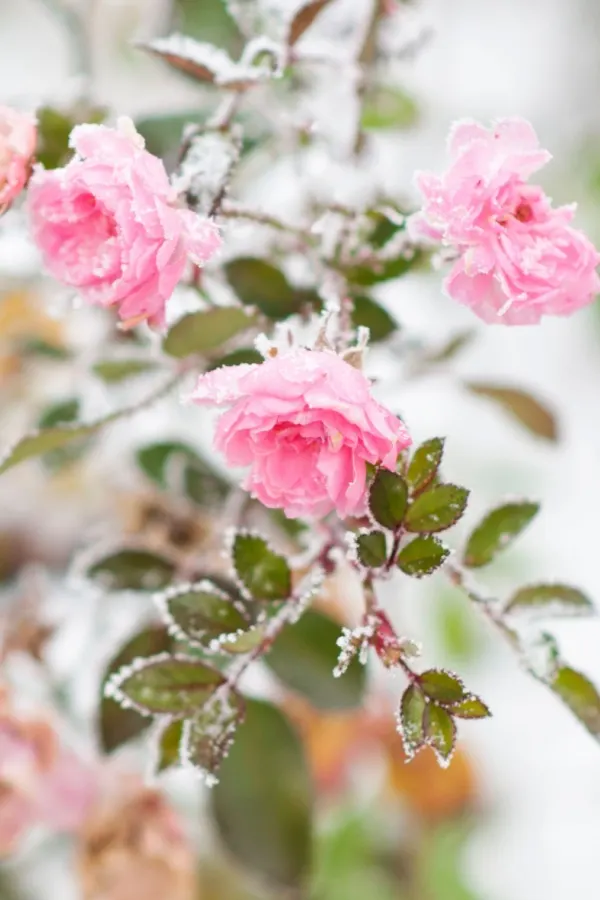
Unfortunately, that new growth is extremely vulnerable to damage from harsh winter conditions. Even more, the resources the plant uses to produce the new growth can take energy from the roots. This can leave the entire rose bush in jeopardy of freezing out during a rough winter. It also leaves it with fewer nutrients for blooms next year.
Know Your Soil’s PH Level
One final note on roses and fertilizing. It’s important to understand that in addition to having plenty of nutrients in the soil, rose bushes prefer growing in slightly acidic soil.
If you are fertilizing your bushes properly and still having blooming issues, it’s a good time to check your soil’s pH. In general, rose bushes prefer to grow in soil with a PH of 6 to 6.5. You can use a handheld pH meter to quickly test your soil’s levels. Affiliate Link: 4-in-1 Soil pH Meter
If it’s too acidic, you can add lime to raise the pH. If it is on the alkaline side, you can add an acid enhancer or sulfur to lower it. Here is to fertilizing for success, and growing bigger and better roses this year! For more rose care tips, see: How To Fertilize & Deadhead Rose Bushes – The 2 Big Secrets To More Blooms!
This Is My Garden
Follow Our Facebook Page For Great Gardening Tips And Advice! This Is My Garden Facebook Page
This Is My Garden is a garden website created by gardeners, for gardeners. Jim and Mary Competti have been writing gardening, DIY and recipe articles and books and speaking for over 15 years from their 46 acre Ohio farm. They publish three articles every week, 52 weeks a year. Sign up today to follow via email, or follow along!
